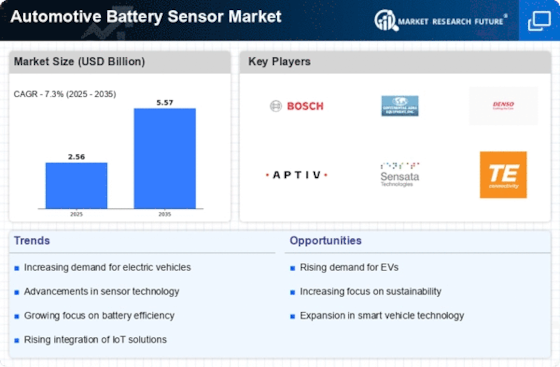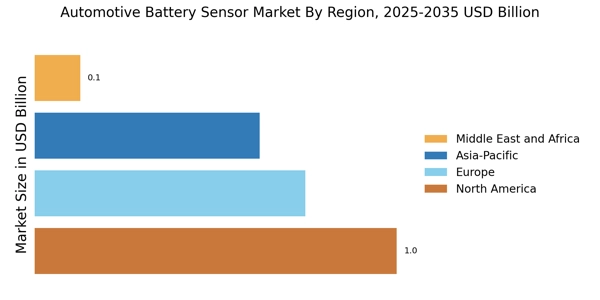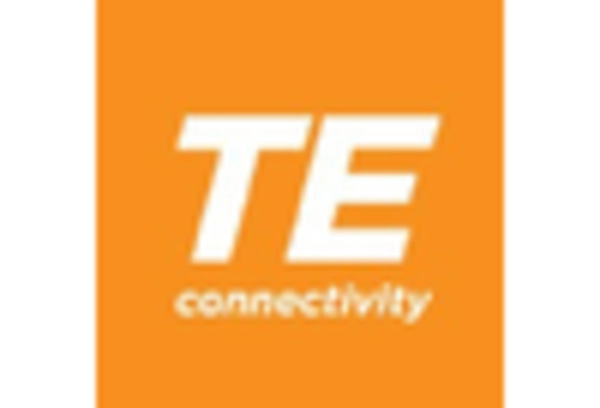Increase in Electric Vehicle Adoption
The surge in electric vehicle adoption is a primary driver for the Automotive Battery Sensor Market. As consumers increasingly opt for electric vehicles, the demand for advanced battery management systems rises. These systems rely heavily on battery sensors to monitor performance, health, and efficiency. In 2025, it is estimated that electric vehicles will account for a substantial percentage of new car sales, further propelling the need for sophisticated battery sensors. This trend indicates a shift in automotive technology, where battery sensors play a crucial role in ensuring optimal performance and longevity of electric vehicle batteries. Consequently, manufacturers are investing in innovative sensor technologies to meet this growing demand, thereby enhancing the Automotive Battery Sensor Market.
Regulatory Support for Emission Reduction
Regulatory support for emission reduction is a significant driver for the Automotive Battery Sensor Market. Governments worldwide are implementing stringent regulations aimed at reducing carbon emissions from vehicles. This regulatory landscape encourages manufacturers to adopt cleaner technologies, including electric and hybrid vehicles, which rely on advanced battery systems. The increasing focus on sustainability is likely to lead to a higher demand for battery sensors that can optimize battery performance and reduce waste. As regulations become more stringent, the Automotive Battery Sensor Market is expected to expand, driven by the need for compliance and the adoption of innovative battery technologies.
Growing Demand for Enhanced Vehicle Performance
The growing demand for enhanced vehicle performance is a key driver for the Automotive Battery Sensor Market. Consumers are increasingly seeking vehicles that offer superior performance, efficiency, and reliability. Battery sensors play a vital role in achieving these performance metrics by providing critical data on battery status and health. As automotive manufacturers strive to meet consumer expectations, the integration of advanced battery sensors into vehicle designs is becoming more prevalent. This trend is expected to continue, with the Automotive Battery Sensor Market benefiting from the heightened focus on performance optimization and consumer satisfaction.
Rising Investment in Automotive Research and Development
Rising investment in automotive research and development is significantly impacting the Automotive Battery Sensor Market. As manufacturers seek to innovate and improve battery technologies, substantial resources are being allocated to research initiatives. This investment is aimed at developing more efficient, durable, and intelligent battery systems that incorporate advanced sensor technologies. The automotive sector is witnessing a shift towards more sophisticated battery management solutions, which are essential for the performance of electric and hybrid vehicles. Consequently, the Automotive Battery Sensor Market is poised for growth as these investments translate into new products and technologies that enhance battery performance and longevity.
Technological Advancements in Battery Management Systems
Technological advancements in battery management systems are significantly influencing the Automotive Battery Sensor Market. Innovations such as real-time monitoring, predictive analytics, and enhanced data processing capabilities are becoming increasingly prevalent. These advancements enable more accurate assessments of battery health and performance, which is essential for both electric and hybrid vehicles. The market for battery management systems is projected to grow at a robust rate, with a notable increase in the integration of smart sensors. This integration allows for improved safety and efficiency, which are critical factors for consumers. As a result, the Automotive Battery Sensor Market is likely to experience substantial growth driven by these technological enhancements.

















